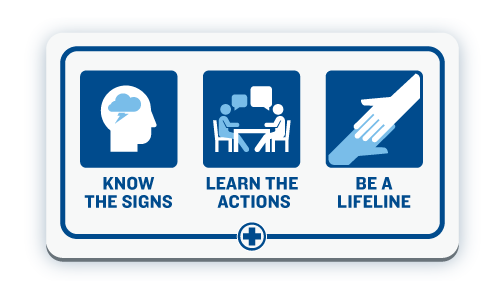24/7 Hotlines: Call or text 988 or text 741741

When someone’s having a heart attack, we know to perform CPR. When someone’s choking we know to use the Heimlich Maneuver. When someone cuts themselves, we know to dress, elevate and apply compression to the wound. Even if we aren’t fully versed in these methods, we know that each of these situations is an emergency and that if we can’t take these steps to intervene, we need to find someone who can – and fast.
But what about when someone’s having a panic attack? What do we do if someone is having a psychotic episode and has become delusional? What if someone is about to harm themselves or another? What do we do in these cases?
That’s where Mental Health First Aid (MHFA) comes in. As with conventional First Aid, Mental Health First Aid is a specific process to follow and skills learned to apply to a crisis situation, only in this case it’s for a mental health crisis rather than a physical health crisis. And as can be seen from some of the examples above, it can be equally as important and can be just as much a life-saving technique.
Mental Health First Aid offers courses, just like conventional First Aid, where you can get trained how to help someone who is having a mental health emergency. I actually had never heard of MHFA until last Fall when my partner got trained but I’ve been wanting to get trained myself ever since. Just this week, Public Radio International (PRI) did a story on how New York City First Lady Chirlane McCray has made mental health a primary focus of hers, expressing her support of mental health first aid training.
To give a general overview, there are 5 Steps (summarized in the acronym ALGEE):
1. Assess for risk of suicide or harm– it is essential to check to see if the person is showing signs of suicidal thoughts or behaviors, non-suicidal self-injury or other harm. If someone is in immediate danger, seek emergency medical attention and if suicidal, call or text 988 or chat 988lifeline.org, which is the 988 Suicide & Crisis Lifeline. They’re free and available 24/7.
2. Listen nonjudgmentally – the ability to listen and have a meaningful conversation is an important skill to have in a mental health emergency. It is essential the person feel respected, accepted and understood. Body language also plays an important role.
3. Give reassurance and information – a mental health crisis can be brought on by an underlying mental illness. Learn how to identify symptoms of mental illness and learn about resources in your area which may be able to provide treatment and support to the person in need.
4. Encourage appropriate professional help – there is an array of professionals trained specifically on how to help someone who is struggling emotionally or living with a mental illness. Whether a psychiatrist, psychologist, social worker or other mental health professional, they can offer solutions through counseling, psychotherapy, medication or other methods.
5. Encourage self-help and other support strategies – there are a multitude of ways someone can foster mental health, including exercise, relaxation and meditation, peer support, prayer and more.
I was so excited to learn about Mental Health First Aid. Developed by Betty Kitchener, a nurse specializing in health education, and Anthony Jorm, a mental health literacy professor, MHFA helps to take knowledge which was formerly relegated to the shrink’s office and spreads it among non-professionals so that anyone can learn how to appropriately respond to a mental health crisis until professional help is available. We’ve seen how this saves lives when it comes to heart attacks, strokes, and other physical emergencies, so I am very hopeful about the prospects as it applies to mental health. And given that, in the United States, one in five people experience mental illness in a given year, it is to everyone’s benefit that more and more people have this knowledge. In fact, I’d even go so far as to say that not doing so would be “crazy”.

© 2024 TurningPointCT.org. All Rights Reserved.